MEET SONA BAI
A FARMER DRIVEN
TO SUCCEED
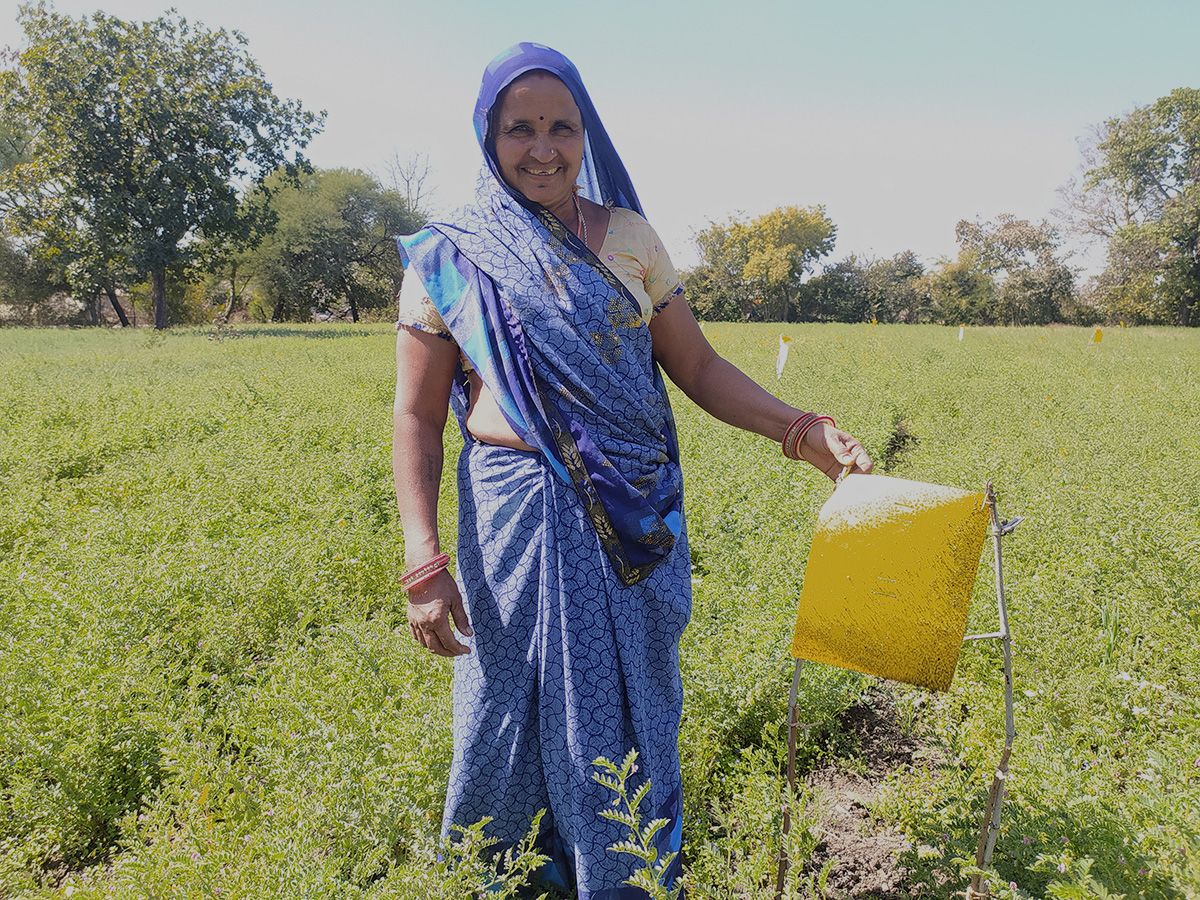
"I am not going to stop until I do my best for my farm."
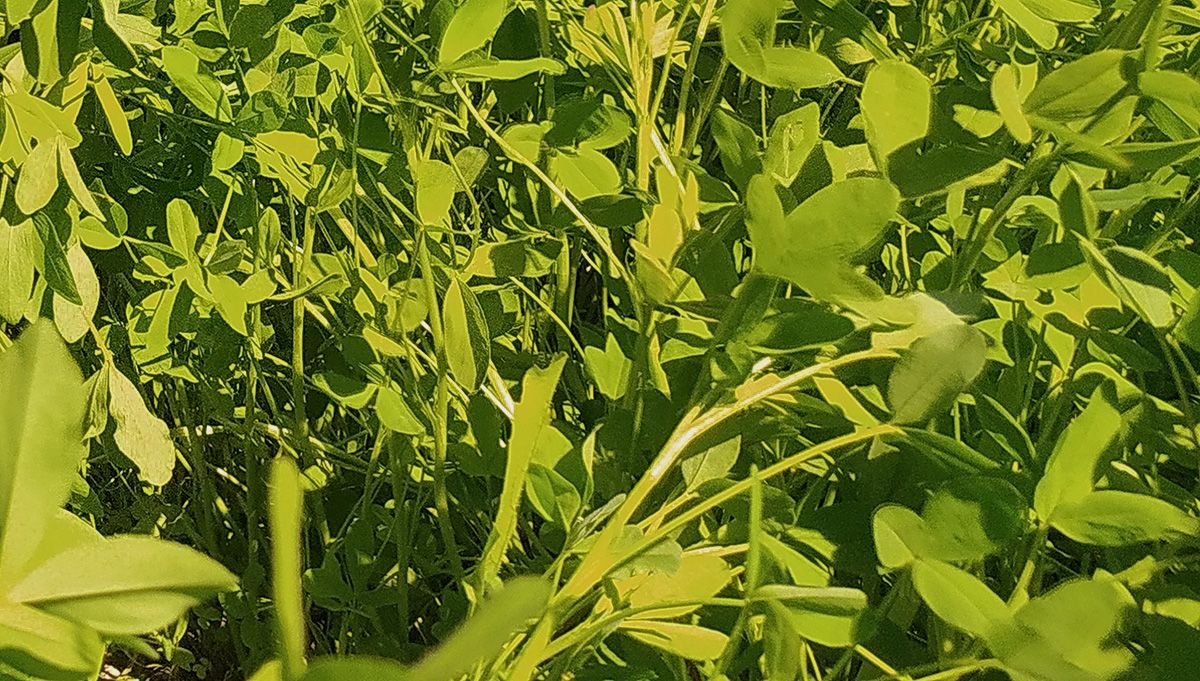
Sona Bai does not believe in giving up.
Sona Bai owns a 1.5-acre parcel in the Agar Malwa district of Madhya Pradesh, India. For a small soy farmer with a family of six, including a grandson attending school, the meager farm income makes it difficult to make ends meet, to say the least.
“Years of monocropping had destroyed my farm. The village shopkeeper would tell me which fertilizers to use and I would buy them without knowing or understanding if my crop really needed these. And then, sudden rains would often destroy my standing crop. Solidaridad became my pillar of support.”
Sona is one of the 6,500 active farmers in her district who are part of the Smart Agri Project, a CSR initiative of Vodafone Idea and Indus Towers, implemented by Solidaridad. Agar Malwa is among the districts where the first phase of the project kicked off in January 2020.
The smart route to farming
Small-scale marginalized farmers make up more than 80 percent of the total farmers in India, but they face numerous challenges and lack access to resources to overcome them, even as pressure to produce more increases with a growing population. A small-scale farmer in India has to fight on many fronts. These challenges include a lack of access to vital agricultural information, water shortages, an over-dependence on erratic monsoons, and a combination of rising input costs and low yields.
Technology can be an enabler for such farmers, helping them access the information they need to farm better and in a smart way. The Smart Agri project empowers small farmers by:
- Enhancing their livelihood through sustainable and climate-resilient farming approaches and use of smart devices/solutions based on artificial intelligence and IoT.
- Building farmer capacity while also increasing farm output in terms of yield, reduced input costs, and other benefits.
- Promoting farmer(s)-owned production companies and rural enterprises to facilitate access to input and markets.
- Building a learning ecosystem in the project areas, raising awareness about nutrition, health and hygiene.
“I never knew this phone could change my life,” says Sona Bai, proudly displaying her phone, which delivers regular weather and agriculture-related alerts. These alerts are generated by the small weather station installed next to her farm. “I listen to the alerts using the missed call facility,” she says.
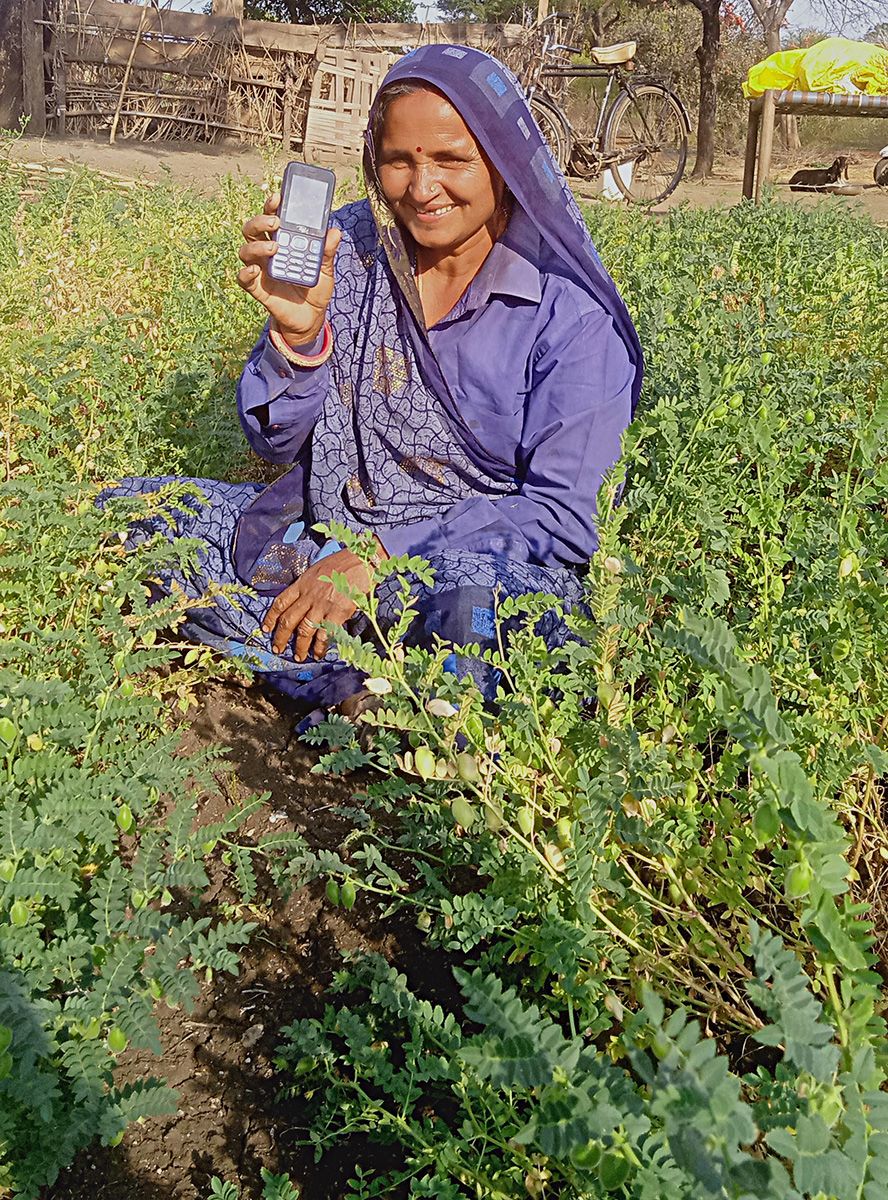
“This lets me send a missed call to the Smart Agri helpline. The helpline calls me back and gives me information on the weather forecast for the next week, any pests in our area, the best time to irrigate and good agricultural practices,” says Sona. This has helped farmers like Sona make informed decisions about agricultural activities on their farms. Around 100 families of Bamaniya Khedi village are now following these advisories which they receive on their mobile phones.
In October, Sona received an alert on heavy rainfall on her phone. The harvest had just ended and the soybean crop was out for drying. After receiving the alert, Sona and other nearby villagers shifted their harvested crops to a safer place and covered them, which saved Sona’s soy crop.
Similarly for another farmer named Devli Kushwah, the alerts helped save her wheat crop and prevent losses.
“Last season, we were about to start irrigating our wheat crop when I received an alert on my phone about a rain forecast. We decided to postpone the irrigation activity,” she says. “Over the next few days, there was heavy rainfall. Had we gone ahead with irrigation, our standing crop would have been destroyed. Plus, we saved Rs 800-Rs 1,000 per acre on irrigation cost,” says Devli, who works with her husband Suresh on 5-acres of land in Gunga village of Bhopal district in Madhya Pradesh.
“I now pay more attention to the alerts,” she says. The couple grows soybean, maize and wheat during the Kharif season, and gram and vegetables during Rabi.
THE SMART SOLUTIONS
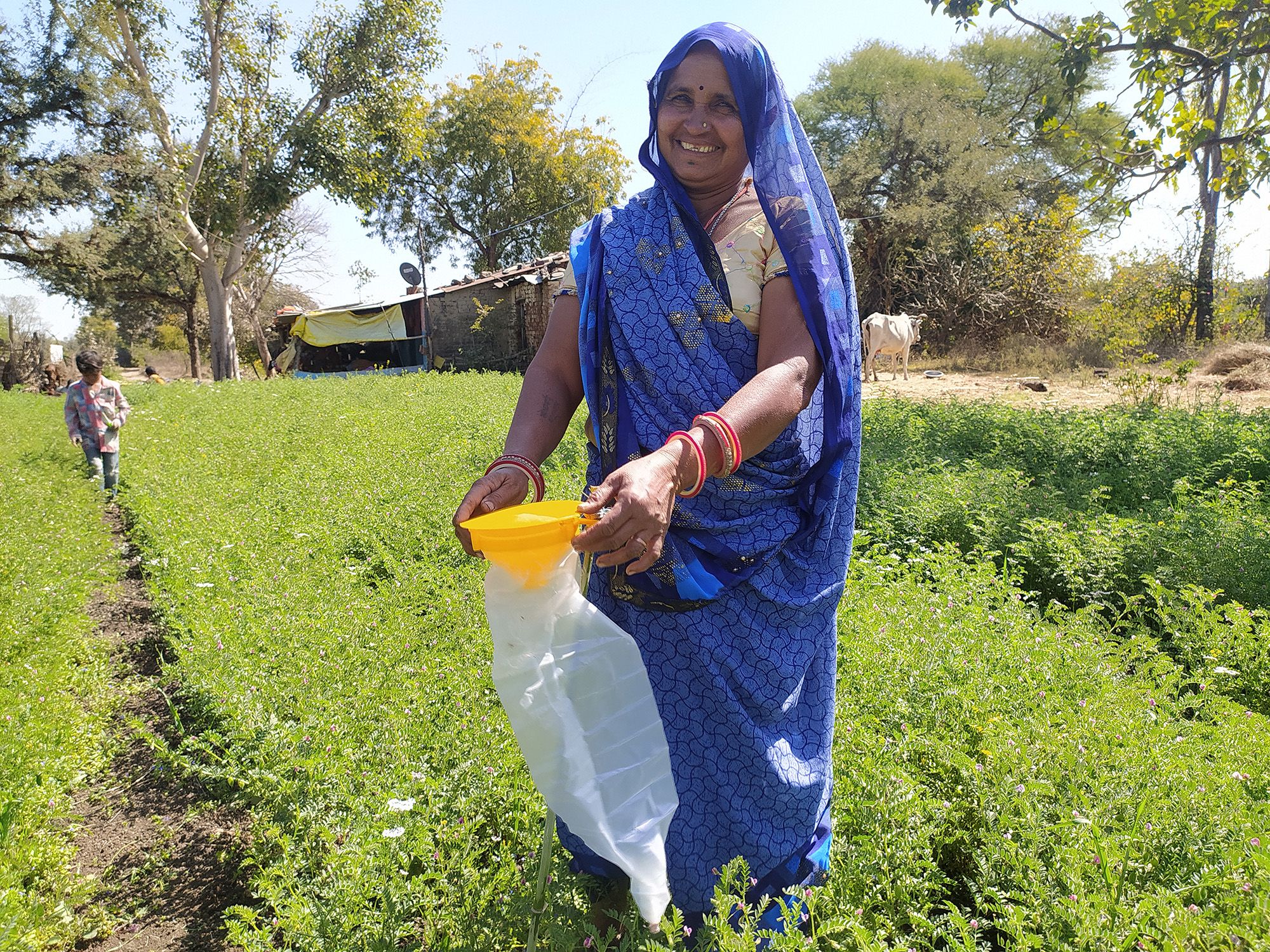
Smart devices, like automated hyper-local weather stations, crop view cameras, insect traps and soil moisture sensors help Sona, Devli and other farmers produce more efficiently. Artificial intelligence and internet-of-things devices installed on the farms capture critical farming information. These tools are low maintenance, powered through solar energy and connected to the internet.
- The weather station provides information on air temperature, humidity, rainfall, wind speed and direction, soil moisture and solar radiation; it measures this data every 5 minutes.
- The crop view HD camera installed on the field helps a farmer analyze key aspects of a crop like quality of the leaves, their color and growth pattern.
- The insect trap provides data on the types (and the concentration) of insects and pests in the field. True to its name, the trap attracts and captures the pest with the camera recording the act.
- The soil probes capture data on soil temperature, salinity, moisture, evaporation, transpiration, and water resistance.
The data collected by these devices is also analyzed and reviewed by agricultural experts and shared with the farmers through localized mobile alerts. Farmers can access these alerts in their local language through push call, mobile application and through the missed call facility, and in some cases, through WhatsApp groups too.
“The outcomes of the Smart Agri Project are overwhelming. Over 5.50 lakh [550,000] farmers across 10 states can access cutting-edge technologies and agronomic practices to overcome production constraints, as well as access better infrastructure facilities and profitable markets,” says Deepender Kumar, General Manager, Corporate Social Responsibility, Vodafone Idea Foundation.
Since its launch, the project has reached farmers in Madhya Pradesh, Maharashtra, Uttar Pradesh, Assam, Telangana, Rajasthan, Tamil Nadu, Odisha, West Bengal, Karnataka, Andhra Pradesh and Gujarat and covers soy, mustard, tea, cotton, oil palm, castor and sugarcane crops. It also supports farmers with intercropping.
Key project outcomes
- More than 600,000 farmers receive regular weather- and agriculture-based alerts in all the project areas;
- The ability for farmers to take informed and timely decisions on issues, including sowing and intercultural operations to ensure better germination, prevention of pests/diseases to remaining crops in case of a pest outbreak;
- A 23 percent increase in average yield, with more than 90 percent of all farmers reporting an increase in yield per hectare;
- Adoption of efficient water management practices by farmers, with more than 80 percent of farmers adopting these in some project areas, which in turn reduced the number of irrigation cycles needed for the crops.
- Customized consultations via phones helped farmers, who earlier had access to limited information through agri-input outlets or Krishi Vikas Kendras (KVKs)
“The Smart Agri Project has enabled our farmers to make informed decisions related to agricultural practices. Smallholders, in particular, who were more susceptible to agricultural losses due to climate change, lack of sustainable practices, unavailability of agricultural inputs, are now receiving advanced and evidence-based solutions to mitigate losses.”

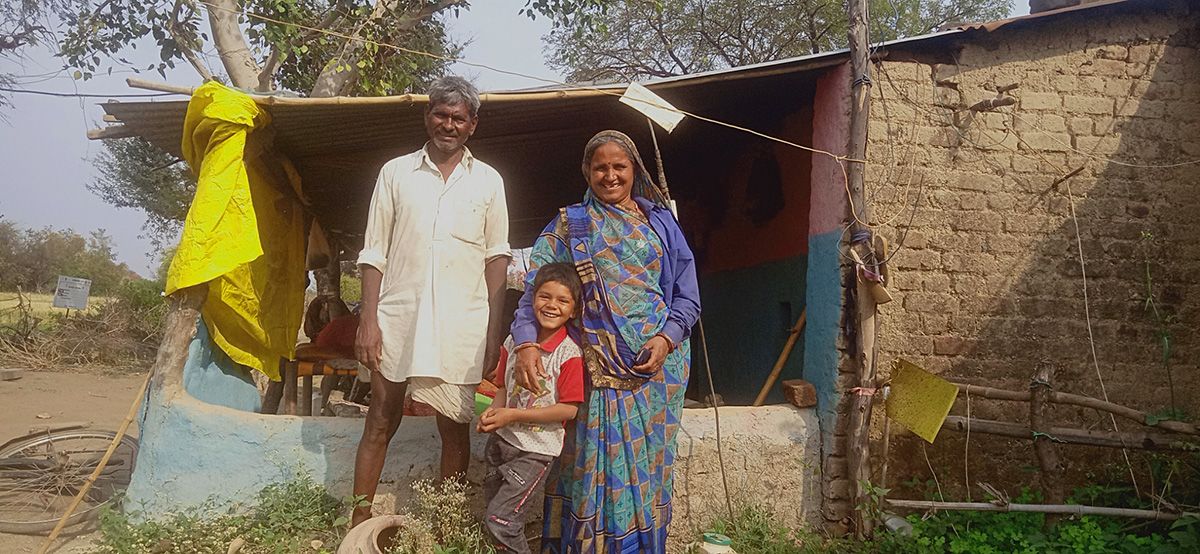
“Sona Bai [and Devli] illustrate how the combination of traditional farming and modern technology can bring about massive changes in agricultural production.”

